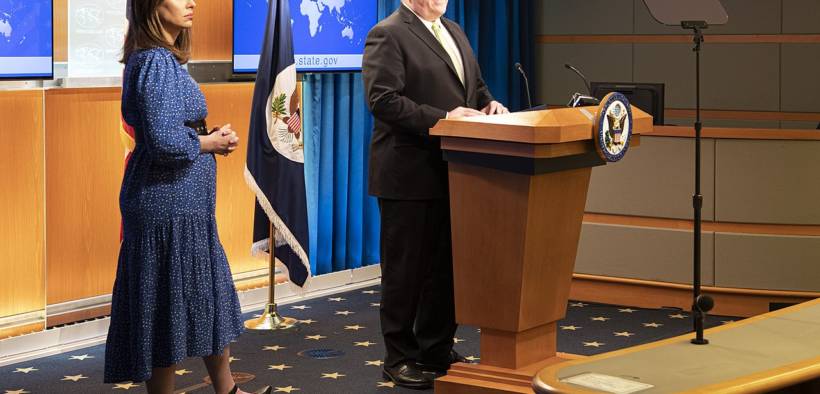Pompeo Signals Hong Kong Special Treatment Could End Soon

Pompeo’s assertion that Hong Kong no longer deserves special treatment could have wide-ranging economic effects for both states, depending on how Trump decides to proceed.
Since the British government divested itself of Hong Kong in 1997, the city has enjoyed a large degree of freedom not found in mainland China. The autonomy allowed the city to prosper and become one of the largest financial centers in the world. That status and the perks that accompany it may soon be coming to an end, however.
No Longer Autonomous
On Wednesday, US Secretary of State Mike Pompeo informed Congress that the Trump administration no longer believes Hong Kong operates with enough independence to justify exclusive trade and economic benefits with America, The New York Times reported.
“I certified to Congress today that Hong Kong does not continue to warrant treatment under United States laws in the same manner as U.S. laws were applied to Hong Kong before July 1997,” Pompeo said. “No reasonable person can assert today that Hong Kong maintains a high degree of autonomy from China, given facts on the ground.”
The reality of the situation, he continued, is that instead of the city leading China into a democratic future, Beijing has instead shaped it into an arm of its authoritarian government. Pompeo’s admission that Washington is reconsidering the special trade status Hong Kong presently enjoys beckoned questions of how its relationship with the US may change.
Beijing is expected to pass a sweeping national security law on Thursday which would criminalize a wide range of activities. While the draft of the law classifies them as secession, subversion, terrorism, and foreign interference, Hong Kong activists are concerned the new law will effectively criminalize democratic expression, according to BBC. Mainland China does not give such freedoms to its people, but under the One Country Two Systems rule, the city has managed its own affairs.
The new law would give Beijing near absolute control of the judicial process and even give rise to a secret Chinese police force outside Hong Kong’s control. A provision in the proposed legislation would allow Beijing to maintain a force within the city “to fulfill relevant duties to safeguard national security in accordance with the law,” CNN reported.
Ending Decades of Special Treatment
US–China relations are already at their lowest point in decades courtesy of a trade war and the COVID-19 pandemic. However, the new law would likely strain the US–Hong Kong relationship, at least economically.
While the Trump administration has yet to announce concrete plans, the idea of levying tariffs, the same that already exist on China, was explicitly mentioned by administration officials, according to Edward Wong of The New York Times. In 1992, the US passed a law certifying that Washington would continue to treat Hong Kong as it had when Britain ruled it, but US President Donald Trump could nullify it with an executive order.
The city, which acts as a global financial hub, would likely experience economic turmoil as a result. Tariffs between the US and China have affected economies in nearly every nation as the two are global trade titans. Applying those same tariffs to Hong Kong would significantly undercut its primary advantage of not being lumped into the same category as mainland China.
The move would not only hurt Hong Kong, but also American businesses and notably the US financial industry. More than 1,300 US companies have locations in Hong Kong including all the big players in the US financial industry, Reuters reported. Last year, the US Census Bureau recored the city as the top US trade partner in terms of trade surplus, which stood at $26.1 billion. Hong Kong currently places zero tariffs on US goods, which helps make the city a lucrative market for US industries.
China’s Light on the Hill
A new US law enacted last year by a bipartisan majority requires Pompeo to file an annual report with Congress, certifying that Hong Kong retains enough autonomy to deserve its special trade status, Bloomberg reported. This report was the one which Pompeo filed Wednesday, stating that it has lost that autonomy.
The scope of the law authorizes sanctions on Chinese and Hong Kong officials for human rights abuses and for interfering with the city’s autonomy. Because many of China’s wealthy elite, including government officials, use their money to buy property across the globe, US sanctions could hinder their ability to do so, if other nations honor those sanctions.
Hong Kong also serves as China’s gateway to the world. Since the end of British rule and the implementation of the One Country, Two Systems policy, the city has served as a way for other states to access mainland China. Furthermore, it is used by Beijing to attract foreign investment, CNBC reported.
“Hong Kong’s role as China’s financial arm for the rest of the world has helped mainland China in keeping its financial sector insulated without suffering the negative consequences of such isolation, i.e. limited access to finance or difficult access to assets in the rest of the world,” French investment bank Natixis reported in August.
Pompeo’s assessment that Hong Kong no longer deserves special treatment could have wide-ranging economic effects for both states, depending on how Trump decides to proceed.















